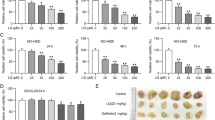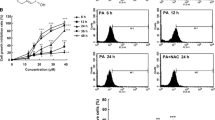Summary
Icaritin, a prenylflavonoid derivative from Epimedium Genus, has been shown to exhibit many pharmacological and biological activities. However, the function and the underlying mechanisms of icaritin in human non-small cell lung cancer have not been fully elucidated. The purpose of this study was to investigate the anticancer effects of icaritin on A549 cells and explore the underlying molecular mechanism. The cell viability after icaritin treatment was tested by MTT assay. The cell cycle distribution, apoptosis and reactive oxygen species (ROS) levels were analyzed by flow cytometry. The mRNA and protein expression levels of the genes involved in proliferation and apoptosis were respectively detected by RT-PCR and Western blotting. The results demonstrated that icaritin induced cell cycle arrest at S phase, and down-regulated the expression levels of S regulatory proteins such as Cyclin A and CDK2. Icaritin also induced cell apoptosis characterized by positive Hoechst 33258 staining, accumulation of the Annexin V-positive cells, increased ROS level and alteration in Bcl-2 family proteins expression. Moreover, icaritin induced sustained phosphorylation of ERK and p38 MAPK. These findings suggested that icaritin might be a new potent inhibitor by inducing S phase arrest and apoptosis in human lung carcinoma A549 cells.
Similar content being viewed by others
References
Jiang L, Luo M, Liu D, et al. BAD overexpression inhibits cell growth and induces apoptosis via mitochondrial-dependent pathway in non-small cell lung cancer. Cancer Cell Int, 2013,13(1):53
Roomi MW, Kalinovsky T, Niedzwiecki A, et al. Modulation of u-PA, MMPs and their inhibitors by a novel nutrient mixture in human lung cancer and mesothelioma cell lines. Int J Oncol, 2013,42(6):1883–1889
Jemal A, Siegel R, Ward E, et al. Cancer statistics. CA Cancer J Clin, 2009,59(4):225–249
Zhu DY, Lou YJ. Inducible effects of icariin, icaritin, and desmethylicaritin on directional differentiation of embryonic stem cells into cardiomyocytes in vitro. Acta Pharmacol Sin, 2005,26(4):477–485
Zhang G., Qin L, Sheng H, et al. A novel semisynthesized small molecule icaritin reduces incidence of steroid-associated osteonecrosis with inhibition of both thrombosis and lipid-deposition in a dose-dependent manner. Bone, 2009,44(2):345–356
Wang Z, Zhang X, Wang H, et al. Neuroprotective effects of icaritin against beta amyloid-induced neurotoxicity in primary cultured rat neuronal cells via estrogen-dependent pathway. Neuroscience, 2007,145(3):911–922
Huang J, Yuan L, Wang X, et al. Icaritin and its glycosides enhance osteoblastic, but suppress osteoclastic, differentiation and activity in vitro. Life Sci, 2007,81(10):832–840
Li QH, Huai L, Zhang CP, et al. Icaritin induces AML cell apoptosis via the MAPK/ERK and PI3K/AKT signal pathways. Int J Hematol, 2013,97(5):617–623
Guo YM, Zhang XT, Meng J, et al. An anticancer agent icaritin induces sustained activation of the extracellular signal-regulated kinase (ERK) pathway and inhibits growth of breast cancer cells. Eur J Pharmacol, 2011,658(2–3):114–122
Wang ZQ, Lou YJ. Proliferation-stimulating effects of icaritin and desmethylicaritin in MCF-7 cells. Eur J Pharmacol, 2004,504(3):147–153
Huang X, Zhu DY, Lou Y. A novel anticancer agent, icaritin, induced cell growth inhibition, G(1) arrest and mitochondrial transmembrane potential drop in human prostate carcinoma PC-3 cells. Eur J Pharmacol, 2007,564(1–3):26–36
Tong JS, Zhang QH, Huang X, et al. Icaritin causes sustained ERK1/2 activation and induces apoptosis in human endometrial cancer cells. PLoS One, 2011,6(3):e16781
He J, Wang Y, Duan F, et al. Icaritin induces apoptosis of HepG2 cells via the JNK1 signaling pathway independent of the estrogen receptor. Planta Med, 2010,76(16):1834–1839
Mirzayans R, Andrais B, Scott A, et al. New insights into p53 signaling and cancer cell response to DNA damage: implications for cancer therapy. J Biomed Biotechnol, 2012,2012:170325
Vogelstein B, Lane D, Levine AJ. Surfing the p53 network. Nature, 2000,408(6810):307–310
Zhang Y, Xu XM, He P. Tubeimoside-1 inhibits proliferation and induces apoptosis by increasing the Bax to Bcl-2 ratio and decreasing COX-2 expression in lung cancer A549 cells. Mol Med Rep, 2011,4(1):25–29
Xiao D, Powolny AA, Moura MB, et al. Phenethyl isothiocyanate inhibits oxidative phosphorylation to trigger reactive oxygen species-mediated death of human prostate cancer cells. J Biol Chem, 2010,285(34):26 558–26 569
Zhu Q, Wang J, Zhang Y, et al. Mechanisms of MPP(+)-induced PC12 cell apoptosis via reactive oxygen species. J Huazhong Univ Sci Technolog Med Sci, 2012,32(6):861–866
Xiao D, Powolny AA, Singh SV. Benzyl isothiocyanate targets mitochondrial respiratory chain to trigger reactive oxygen species-dependent apoptosis in human breast cancer cells. J Biol Chem, 2008,283(44):30 151–30 163
Oltersdorf T, Elmore SW, Shoemaker AR, et al. An inhibitor of Bcl-2 family proteins induces regression of solid tumors. Nature, 2005,435(7042):677–681
Metrailler-Ruchonnet I, Pagano A, Carnesecchi S, et al. Bcl-2 protects against hyperoxia-induced apoptosis through inhibition of the mitochondria-dependent pathway. Free Radic Biol Med, 2007,42(7):1062–1074
Yang HL, Chen CS, Chang WH, et al. Growth inhibition and induction of apoptosis in MCF-7 breast cancer cells by Antrodia camphorata. Cancer Lett, 2006,231(2):215–227
Yao Y, Huang C, Li ZF, et al. Exogenous phosphatidylethanolamine induces apoptosis of human hepatoma HepG2 cells via the bcl-2/bax pathway. World J Gastroenterol, 2009,15(14):1751–1758
Jiang TS, Zhou LP, Zhang WL, et al. Effects of sinomenine on proliferation and apoptosis in human lung cancer cell line NCI-H460 in vitro. Mol Med Rep, 2010,3(1):51–56
Gen G, Zhao YP, Yang L, et al. Anti-proliferative effect of clitocine from the mushroom Leucopaxillus giganteus on human cervical cancer HeLa cells by inducing apoptosis. Cancer Lett, 2008,262(2):190–200
Fuster JJ, Sanz-Gonzalez SM, Moll UM, et al. Classic and novel roles of p53: prospects for anticancer therapy. Trends Mol Med, 2007,13(5):192–199
Park KR, Nam D, Yun HM, et al. beta-Caryophyllene oxide inhibits growth and induces apoptosis through the suppression of PI3K/AKT/mTOR/S6K1 pathways and ROS-mediated MAPKs activation. Cancer Lett, 2011,312(2):178–188
Zhu JF, Li ZJ, Zhang GS, et al. Icaritin shows potent anti-leukemia activity on chronic myeloid leukemia in vitro and in vivo by regulating MAPK/ERK/JNK and JAK2/STAT3/AKT signalings. PLoS One, 2011,6(8):e23720
Author information
Authors and Affiliations
Corresponding authors
Additional information
This project was supported by grants from Wuhan Municipal Science and Technology Research Project, China (No. 201260523185), and the Public Science and Technology Research Funds Projects of Ocean, China (No. 201005013).
Rights and permissions
About this article
Cite this article
Zheng, Q., Liu, Ww., Li, B. et al. Anticancer effect of icaritin on human lung cancer cells through inducing s phase cell cycle arrest and apoptosis. J. Huazhong Univ. Sci. Technol. [Med. Sci.] 34, 497–503 (2014). https://doi.org/10.1007/s11596-014-1305-1
Received:
Revised:
Published:
Issue Date:
DOI: https://doi.org/10.1007/s11596-014-1305-1




